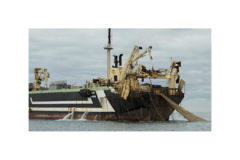Greens push for radical changes in Scottish fisheries
SFF: Report ‘not realistic and wrong approach’
Leading green groups have made calls for more highly protected marine areas in Scottish waters, low-impact fishing by 2021, restrictions on heavy mobile gear in inshore waters, cameras on all boats, and a reallocation of fishing licences, reports Tim Oliver.
WWF, RSPB Scotland and the Scottish Wildlife Trust have set out 11 major interventions that they say are necessary for nature’s recovery in Scotland, including in Scottish fisheries.
The Scottish Fishermen’s Federation has slammed the report as ‘detached from reality’ and the wrong way to develop public policy, and said that fishermen have a vested interest in sustainability (see below).
In their just-published document, the NGOs say that some actions could be prioritised by the Scottish government over the next six months, and that the package of policies must be delivered within the next five to 10 years.
The report calls on all political parties in Scotland to champion nature, and to include the actions it calls for in their party manifestos for the 2021 Scottish elections.
The fisheries section of the report calls for new legislation to achieve sustainable, low-impact fishing by the end of 2021. The report claims that this is needed because only 54% of stocks are currently being fished sustainably, and catch limits are being ‘consistently set above independent scientific advice’.
It also says that some fishing activity ‘causes widespread damage to the seafloor’, and that other fishing activities pose a risk of accidental capture to birds, whales and dolphins. “This is partly because fishing has not been held to the same environmental standards as other at-sea industries,” alleges the report.
“Effective fisheries management must go beyond fish stock health, and adopt a broader ecosystem approach that ends overfishing, minimises damage to non-target species and habitats and leads to a recovery in the health of marine habitats and ecosystems. A paradigm shift in fisheries management is urgently needed to deliver the change required to restore the marine environment,” says the report.
It calls for Scotland to introduce ‘world-leading legislation, policy and governance that delivers ecosystem-based fisheries management, fully integrated with conservation objectives by 2021’.
The reports says that measures to achieve this should include:
- Fishing in accordance with the best available independent scientific advice
- Delivering spatial management of all gear types and the exclusion of some gears, including a presumption against heavy bottom-towed mobile fishing gear in a significant part of Scotland’s inshore waters
- All fishing vessels in Scottish waters to use remote electronic monitoring with cameras (REM), to ‘ensure full and verifiable documentation of catches of target and non-target species, deliver robust monitoring, and support enforcement and compliance as well as provide assurance to retailers and consumers’
- A wholesale review of the fleet. This should include ‘a phased and just revocation and reallocation of all fishing licences according to clear social and environmental criteria, including climate impacts’. This new licensing system must place ecosystem health ‘at the core of all decision-making’ to secure environmental benefits, and benefits for dependent coastal communities.
The report says that the measures it is calling for will produce economic, social, food supply and climate benefits.
It argues that rebuilding stocks will enhance productivity and deliver long-term stability and employment opportunities and higher revenues and profits. Long-term sustainability will also provide stability to coastal communities that benefit from and depend on fishing, it says.
The report also argues that reliable supply of locally caught seafood is essential to helping Scotland to achieve long-term food security, and that healthier marine ecosystems that have a higher capacity to store carbon will help towards mitigating the effects of climate change.
‘A Nature Recovery Plan – 11 Transformative Actions for Nature in Scotland’ can be read at: bit.ly/3hxqcyu
More and stronger MPAs needed
The green NGOs’ report calls for at least 30% of Scotland’s seas to be highly protected, with at least 10% fully protected, by 2030.
This mirrors in Scottish waters the recent Benyon Report to DEFRA that recommended highly protected marine areas in English waters, which was slammed by the NFFO (Fishing News, 6 August, ‘Industry blasts report proposing NTZ network’).
The legacy of historic impacts combined with emerging threats from coastal and offshore development and extraction, as well as climate change, mean that the marine environment faces intense pressures, says the report.
MPAs are ‘tried and tested tools for conservation’, it says. The Scottish MPA network currently covers 22% of the Scottish marine area, but many sites do not have management plans, and those MPAs with management plans still allow damaging industrial activity to continue.
Effectively managed MPAs can promote recovery of critical habitats that support fish and shellfish. As stocks increase within a protected area, the individuals, eggs and larvae can ‘spill over’ to support thriving commercial fisheries, argues the report.
It calls for an independent commission to advise on the transformation of MPA management in Scottish seas. This, it says, should also provide advice on the condition and ecological coherence of the existing network, and consider new sites.
“Scottish residents have shown their support for sustainable use and management of our seas and creation of MPAs,” says the report. “It is now time for decision-makers to act decisively to deliver effective protection and management of Scotland’s seas.”
A Scottish government spokesperson said: “We recognise the importance of sustainable fisheries and protection of the marine environment. These are key themes of our future fisheries management proposals, which we will publish in due course.
“Our marine protected area network already covers more than 22% of our seas. We have committed to increasing this to 30% by 2030, and consulted on additional proposals to achieve this. We will consider the need for new targets once new global frameworks are agreed in 2021.”
SFF: Report ‘detached from the real world’
Commenting on the NGOs’ report, Elspeth Macdonald, chief executive of the SFF, said that the report was ‘completely detached from the real world’ and contained ‘a series of wholly unrealistic suggestions and unsubstantiated statements’.
She said: “Firstly, the fishing industry in Scotland has a strong vested interest in sustainability, and has been committed for many years to managing stocks in this way. Our industry is made up of individuals, families and businesses who are invested in it for the long term. They want to pass these businesses on to future generations in good heart, so fishing responsibly and sustainably is key to long-term business sustainability.”
She said that all the research shows that fishing is a low-carbon means of healthy protein production, and that the North Sea and North East Atlantic fisheries are among the best-managed in the world.
“It is not uncommon to find skippers, supported by their representative associations, striving to build a better knowledge and stock status and assessments, and taking a direct interest in the science in our region,” she said.
“That is because management is based on scientific evidence, not blithe assertion of the type on display in the report.
“As the UK leaves the Common Fisheries Policy behind at the end of this year, we have an ongoing dialogue with Marine Scotland and DEFRA about future fisheries management, and as a responsible industry we are continuously striving to minimise our environmental impact.
“This co-operation is based on evidence, mutual respect, continuous dialogue and constructive compromise, seeking to find a balance between a sustainable and healthy fishing sector and the protection of the environment and of the stocks on which our businesses depend.
“This is the right way to develop public policy. The approach set out in this report is not.”






